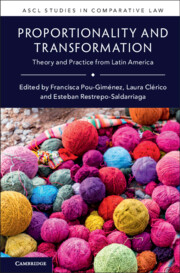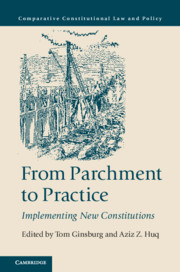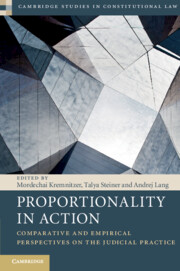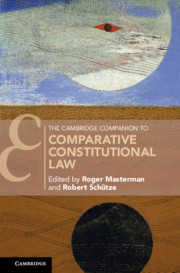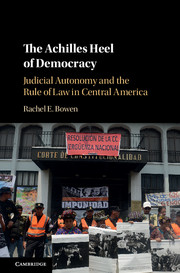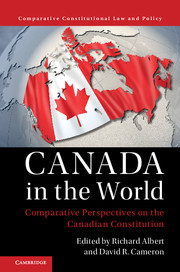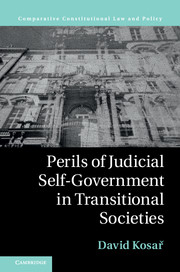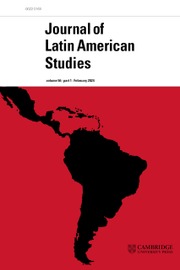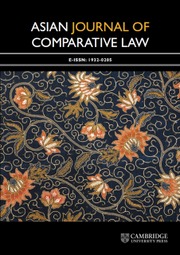Proportionality and Transformation
Theory and Practice from Latin America
£95.00
Part of ASCL Studies in Comparative Law
- Editors:
- Francisca Pou-Giménez, Institute for Legal Research, Universidad Nacional Autónoma de México
- Laura Clérico, Universidad de Buenos Aires, Argentina
- Esteban Restrepo-Saldarriaga, Universidad de los Andes, Colombia
- Date Published: November 2022
- availability: Available
- format: Hardback
- isbn: 9781009201803
£
95.00
Hardback
Other available formats:
eBook
Looking for an inspection copy?
This title is not currently available on inspection
-
This is the first book on proportionality in Latin American constitutional law. Leading scholars in the region explore how proportionality analysis has become a key part of the constitutional law of a region where, almost paradoxically, constitutions with clear transformative intentions coexist with the highest indicators of social inequality in the world. In this book, scholars, practitioners and students will find a fascinating account of how proportionality has been a central concept in Latin America's constitutional struggles to curtail excessive uses of state power. The book illustrates how, more recently, proportionality has played an important role in national processes of constitutionalization and transitional justice, and how its current uses in the domain of social rights endow it with a distinctive meaning and role in regional constitutionalism. This pioneering book opens up the space for a much needed global conversation on how Latin America has decisively contributed to comparative constitutional law.
Read more- Presents theories and analysis of legal practice showing how proportionality is part of the Latin American regional project of using constitutional law and adjudication to confront power abuse and social inequality in a quest for social transformation
- Provides an account of how key comparative law concepts, such as proportionality, evolve through different modalities of interaction and dialogue between the North and the South
- Gives examples of how proportionality works under different Latin American constitutions and provides material for further comparative regional and worldwide assessments
Reviews & endorsements
'… a valuable resource about the use of the proportionality doctrine in Latin America. … [and a] highly welcome addition to the research on proportionality. … providing a more description of the proportionality practice, it includes many excellent chapters that are worth reading.' Niels Petersen, Zeitschrift für ausländisches öffentliches Recht und Völkerrecht / Heidelberg Journal of International Law
Customer reviews
Not yet reviewed
Be the first to review
Review was not posted due to profanity
×Product details
- Date Published: November 2022
- format: Hardback
- isbn: 9781009201803
- length: 376 pages
- dimensions: 235 x 159 x 24 mm
- weight: 0.65kg
- availability: Available
Table of Contents
Part I. Proportionality and Processes of constitutionalization:
1. The Standard Reasonableness Test and Proportionality in Argentina: a matter of interactions Laura Clérico and Federico de Fazio
2. Proportionality in the case law of the constitutional court of Ecuador Daniela Salazar Marín and Ramiro Ávila Santamaría
3. Proportionality and human rights in Mexico Arturo Bárcena Zubieta
4. Proportionality and the construction of democracy: notes from the Peruvian jurisprudence Pedro Grández Castro
5. Proportionality in the case law of the Chilean constitutional court Verónica Undurraga and Pascual Cortés
Part II. Proportionality in Social Rights and Equality-based Adjudication:
6. Socio-economic rights in the Colombian constitutional jurisprudence: proportionality and the prohibition of retrogressive measures Magdalena Correa Heano and Alejandra Osorio Alvis
7. Progressive realization, non-retrogression, and maximum of available resources. Agreements and disagreements between the Inter-American court and the United Nations ESCR committee Julieta Rossi
8. Proportionality in the adjudication of equality and non-discrimination cases in the Inter-American system Silvia Serrano
9. Transformation and its limits: proportionality, courts, and social rights in Brazil Virgilio Afonso da Silva and Paula Gorzoni
Part III. Proportionality, Between Transformation and the Status Quo:
10. Between exception and transition: proportionality and necessity in the Colombian quest for peace Antonio Barreto Rozo and Jorge González-Jácome
11. Proportionality and state Ius Puniendi, Mary Beloff
12. Distributional analysis as an alternative to proportionality analysis in judicial decision-making Isabel Cristina Jaramillo Sierra
13. Proportionality, social justice, and democracy Martín Aldao
14. Unilateralism, dialogue, and false necessity: the distribution of the burden of proof in proportionality analysis Francisca Pou-Giménez
Epilogue. The elephant in the room Jamal Greene.
Sorry, this resource is locked
Please register or sign in to request access. If you are having problems accessing these resources please email [email protected]
Register Sign in» Proceed
You are now leaving the Cambridge University Press website. Your eBook purchase and download will be completed by our partner www.ebooks.com. Please see the permission section of the www.ebooks.com catalogue page for details of the print & copy limits on our eBooks.
Continue ×Are you sure you want to delete your account?
This cannot be undone.
Thank you for your feedback which will help us improve our service.
If you requested a response, we will make sure to get back to you shortly.
×
